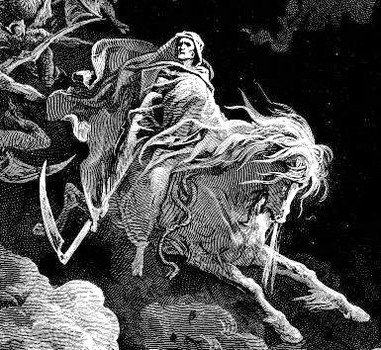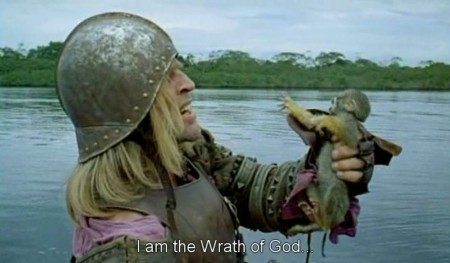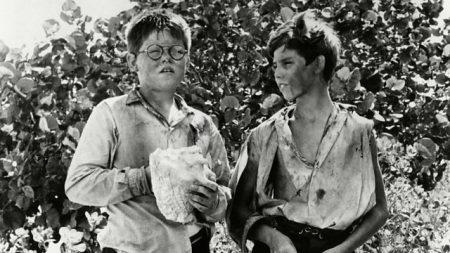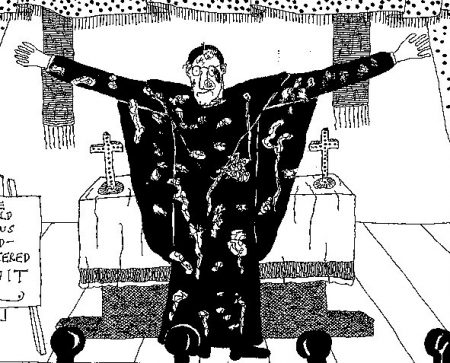
He was exceedingly pale, and he sat astride a horse. He was the Pale Horseman. The horse was an elegant nut-brown something-or-other, with splendid fetlocks and a terrific mane. I use the word “terrific” because it was terrifying, that mane, on that horse. It certainly terrified the horseman. Why do you think he was so pale?
Clip-clop along the lane went the horse, through dense forest, and the horseman sat tall in the saddle, like the best of heroes in a cowboy film. Here it is worth noting that, though there are cowboys, there are no boy cows. All cows, wherever in the world you roam, are girls. As for the horse, be it a girl horse or boy horse, that does not matter to us, and nor did it matter to the horseman, who shuddered as he contemplated its terrific mane. But he pulled himself together, and clip-clopped onwards, or rather the horse clip-clopped, while the horseman sat.
The lane stretched from Pointy Town at one end to Tantarabim at the other. If you are familiar with the geography of this land – and if you are only half-educated, you damned well ought to be – you will know it was a very long lane indeed. The point where we met the Pale Horseman, deep in the dense forest, was roughly halfway along the lane. He was on his way from Pointy Town to Tantarabim.
There were many inns on or just off the lane, at which travellers such as the Pale Horseman and his horse could spend the night. Each inn was named after an album by Jethro Tull, except one, known as Exotic Birds And Fruit, which shared its name with an album by Procol Harum. This anomaly was occasioned by muddled thinking on the part of the Nomenclature of Inns Pursuivant. It was a costly misattribution. He was taken out and shot.
As it happened, the clearing in the forest where the execution took place was just yards away from where the Pale Horseman stopped his horse, that morning. He was intent on paying homage to the Pursuivant at the spot where he had fallen. While his horse scratched its innocent behind on a tree, the Pale Horseman stood with head bowed in the clearing, muttering a few words under his breath. Then, as a mark of devotion to the departed, he placed on the ground a piece of fruit taken from his pocket. It was a toffee apple.
Returning to his horse, the Pale Horseman saw that it was disconcerted and fractious, its mane even more terrific. Although he was already deathly pale, such was his terror that the Pale Horseman visibly blanched. In the dense forest, he was surrounded by wood, so had a French person been present, they could have described him as “blanche doo bwa”. He remounted his horse and set it off at a clip-clop towards the seaside belvederes of Tantarabim.
That night they stayed at the Catfish Rising inn. It was home to a cat, but not to any fish, unless one counted a few blennies, dead on a slab in the kitchen, ready to be served for supper. The Pale Horseman was not fond of fish, and opted instead for jugged hare with a side helping of smokers’ poptarts. These vittles did nothing to alter his pallor. Anent the inn, in its stables, the horse was fed and watered from a cement trough. Somewhere in the night, owls hooted and swooped upon small terrified scurrying mammals.
Usually, whenever I recite this story, I pause at this point and invite questions from the audience, if there is one. Sometimes there is not. I have told this story while standing on a dais in an empty barn. But if one or two are gathered to hear it, the questions most often asked are Why is the Pale Horseman going from Pointy Town to Tantatrabim? and Please level with us, is the Pale Horseman a personification of Death? Very occasionally someone will ask me to explain what was so terrifying about the horse’s mane. But nobody, nobody, has ever asked What was the horse’s name? or Did the horse become fractious because it thought it was going to be given the toffee apple as a snack?
Whatever questions I am asked, I like to give full and detailed answers, at great length. Thus, for example, I might find myself listing every single album release by Jethro Tull. Not only do I give the album titles, in chronological order, but I will add the track listing and full credits as shown on the sleeve of the original release. If in puckish mood, I will also recite, from memory, any liner notes, which, in the case of Thick As A Brick (1972), can take up most of the afternoon. If in even more puckish mood, I will do the same for the complete Procol Harum discography. My knowledge of horsemen and horses is equally encyclopaedic, so by the time I am done answering questions, any audience members still awake will almost certainly have forgotten the story so far. They may even have had the Pale Horseman and his horse and the lane from Pointy Town to Tantarabim wiped from their puny brains, while they fixate upon, say, the precise pattern upon the headband habitually worn by “stout, nimble” Glenn Cornick, bass guitarist of Jethro Tull from 1968 to 1970.
When I resume my tale, therefore, they barely notice that the Pale Horseman and his horse are clip-clopping slowly, slowly along the lane in the opposite direction, from Tantarabim to Pointy Town. When I have them stop around half-way, at the clearing where the Nomenclature of Inns Pursuivant was shot, and the Pale Horseman retrieves the votive toffee apple, removes its cellophane wrapping, and feeds it as a snack to his horse, some in the audience put up their hands to ask how in the name of heaven the Pale Horseman knew the toffee apple was there, lying on the ground in the clearing a few yards off the lane, but I shush them and tell them the time for questions is over.
And so it is that they never get to hear how Death was visited upon Tantarabim, how every last Tantarabimite, from aged crones to tots and tinies, toppled over and died at sight of the Pale Horseman, as due punishment for some ancient sin, and how for a hundred years or more it was home only to swarms of flies and maggots, and nobody dared utter its name.







